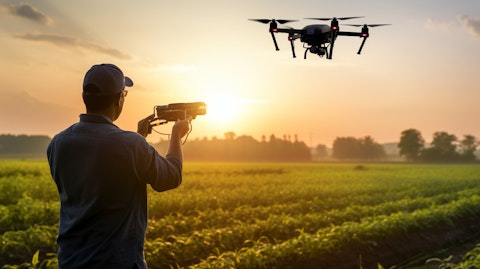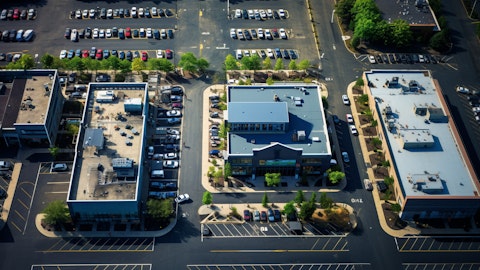In this article, we look at the 8 Best Small Cap Agriculture Stocks to Buy.
Agricultural Growth & the Role of Technology
The agriculture market consists of various sectors, including animal production, crop production, and rural activities. Agricultural products are categorized as organic or conventional and distributed through channels like supermarkets, hypermarkets, convenience stores, e-commerce, and other retail outlets. According to a report by Research and Markets, the agriculture market was valued at $14.35 trillion in 2024 and is projected to grow to $19.28 trillion by 2028, at a CAGR of 7.7%. This growth can be attributed to several factors, including population growth, the globalization of trade, the use of crop products, and supportive government policies such as rural development programs. The OECD and FAO predict a 13% growth in cereal production by 2027 as the global population is projected to reach 10 billion by 2050.
Adoption of sustainable agriculture practices, advancements in crop genetic engineering, increased focus on organic farming, vertical farming, and the implementation of water management solutions are on the rise. AI, digital marketplaces for agricultural products, autonomous farming equipment, and farm management software products are also contributing to the market. Consumer preferences are shifting towards healthier and more diverse diets with nutrient-rich foods. Companies are also focusing on digital farming platforms like Climate FieldView, which provide farmers with data-driven insights.
In March 2021, The Climate Corporation introduced Climate FieldView in South Africa. The platform helps farmers analyze detailed farm data, offering compatibility across various equipment types and connectivity to multiple farm management software systems and helps farmers to make informed decisions and improve operations. Drones and GPS tools are the most commonly used AI technologies in agriculture. AI applications will help farmers identify pests on crops and determine if they pose a threat. Technologies like these are becoming essential for the agricultural sector and assist farmers in identifying areas of their crops that require more or less attention.
Digital agriculture is transforming farming through the adoption of advanced technologies such as IoT sensors, drones, and robotic harvesters, which facilitate data-driven decisions, optimized resource use, and enhanced productivity. Regenerative agriculture, which emphasizes sustainable practices, aims to improve soil health, foster biodiversity, and minimize environmental impact. Precision agriculture leverages GPS, sensors, and data analytics to meticulously manage crops, allowing for targeted application of water, fertilizers, and pesticides, thereby increasing efficiency and reducing environmental footprints.
The use of agricultural robotics, including autonomous tractors and drones is addressing labor shortages while boosting efficiency, precision, and safety. AI further revolutionizes the sector by providing virtual models for testing and offering predictive insights to optimize processes. Sustainable practices, supported by automated irrigation systems and precision agriculture, contribute to eco-friendly farming and better yields. Additionally, RFID and blockchain technologies enhance food traceability and safety by enabling real-time tracking from farm to table, thereby reinforcing consumer trust in food quality and integrity. AI is assisting farmers and supply chains in managing climate-related risks.
A significant challenge the industry is facing is a labor shortage, which threatens the profitability and productivity of farms. This shortage is caused due to an aging farmer population and younger generations are less likely to take over family-run farms, opting instead for less labor-intensive and better-paying jobs. The situation is compounded by the decline in immigrant labor, which has traditionally filled many agricultural roles. However, in the coming years, there will be other innovative tools, including self-driving tractors and combines to address these concerns.
In a CNBC interview on September 20, 2023, Jonathon Quigley, Founding Partner of Cultiv8 Funds Management, emphasized the firm’s optimistic outlook on the agriculture and food technology sectors, with a particular focus on companies addressing long-term structural challenges, especially in food security. Cultiv8 prioritizes investments that tackle critical issues such as environmental degradation and climate change. The firm concentrates on areas with sustained growth potential, including automation, robotics, climate adaptability, and emissions reduction. Cultiv8 is optimistic about innovative companies that are making significant advancements in areas such as robotic pollination, methane emission reduction, antibiotic alternatives, and sustainable water treatment.
The agriculture sector is transforming rapidly to meet the rising food demand and investors see significant potential in agriculture stocks. As the industry adapts to modern technologies with advancements in AI, digital platforms, and sustainable farming practices, the agriculture market is poised for continuous growth. With that in context, let’s take a look at the 8 best small-cap agriculture stocks to buy.

A technician piloting a drone, demonstrating the company’s precision agriculture and fleet management solutions.
Our Methodology
For this article, we used the Finviz screener to screen for small-cap agriculture companies. We also checked agriculture ETFs to make sure we did not miss any stocks. We selected 8 small-cap agriculture stocks that were the most widely held by institutional investors. The list is sorted in ascending order of hedge fund sentiment, which was taken from our database of 920 elite hedge funds as of Q1 of 2024.
Why do we care about what hedge funds do? The reason is simple: our research has shown that we can outperform the market by imitating the top stock picks of the best hedge funds. Our quarterly newsletter’s strategy selects 14 small-cap and large-cap stocks every quarter and has returned 275% since May 2014, beating its benchmark by 150 percentage points (see more details here).
8 Best Small Cap Agriculture Stocks to Buy
8. CVR Partners (NYSE:UAN)
Number of Hedge Fund Holders: 3
Market Capitalization as of August 9 : $779.50 Million
CVR Partners (NYSE:UAN) is involved in the production, marketing, and distribution of nitrogen fertilizer products. The company primarily produces urea ammonium nitrate (UAN) and ammonia, which are mainly used by farmers to enhance crop yield and quality. CVR Partners (NYSE:UAN) nitrogen fertilizer manufacturing facilities in the United States produce a total of 2,375-ton-per-day ammonia units and 4,050-ton-per-day UAN units.
For the three months ending on June 30, CVR Partners (NYSE:UAN) reported that its revenue increased to $132.90 million compared to $127.66 million in the previous quarter. The company also decreased its operating expenses by 15%. Commenting on financial results, Mark Pytosh, Chief Executive Officer of CVR Partners (NYSE:UAN) said:
“CVR Partners reported solid operating results for the second quarter of 2024 driven by safe, reliable operations and a combined ammonia production rate of 102 percent. The spring planting season experienced some weather interruptions, however, planted acreage was higher than expected and demand for nitrogen fertilizer was strong.”
Nitrogen fertilizer is a global market and the US is the third-largest importer of Nitrogen fertilizers. Nitrogen fertilizer industries use natural gas and the low cost of natural gas in the United States help producers to have a massive advantage in the global market. Furthermore, the North American fertilizer market has a high demand and limited supply, which could create an opportunity for established plants. CVR Partners (NYSE:UAN) is an attractive stock with substantial growth potential due to its strategic location near the U.S. corn belt, production of low-carbon ammonia, use of pet coke as feedstock, and focus on nitrogen fertilizers for agriculture.
The company is valued at $779.50 million as of August 9. As of the first quarter, the stock is held by 3 hedge funds with total stakes worth $307.36 million. Icahn Capital LP is the largest shareholder in the company and has a stake worth $305.87 million as of March 31.
7. Limoneira Co (NASDAQ:LMNR)
Number of Hedge Fund Holders: 4
Market Capitalization as of August 9: $369.58 Million
Limoneira Co (NASDAQ:LMNR) is a 131-year-old international agribusiness that produces lemons, avocados, and other crops. The company has over 11,000 acres of agricultural land and over 21,000 acre-feet of water rights in Arizona, California, Chile, and Argentina. Limoneira Co (NASDAQ:LMNR) also deals in real estate development and capital investment activities.
On June 6, Limoneira Co (NASDAQ:LMNR) reported that its agribusiness revenue increased to $46.7 million from $43.3 million and revenue from other operations also increased 8% to $1.4 million, compared to the same quarter in the previous year. However, results were impacted by increased rainfall in California that delayed the picking of lemons and caused fresh utilization in the second quarter to fall to around 70%.
Limoneira Co (NASDAQ:LMNR) anticipates an additional 700 acres of non-bearing lemons will become fully productive over the next four to five years, including 200 acres expected to reach full production by FY24. The company anticipates $131 million from harvest over nine fiscal years. Limoneira Co (NASDAQ:LMNR) also expects to realize $30 million in planned incremental EBITDA growth over the next seven fiscal years, stemming from various areas including completed projects ($4 million), grower partner growth ($4 million), agency growth ($4 million), farm management services growth ($3 million), and avocado expansion ($15 million).
Limoneira Co (NASDAQ: LMNR) presents a compelling investment opportunity. The company’s expansion plans further bolster its potential which will become fully productive over the next four to five years. These factors make Limoneira Co (NASDAQ: LMNR) one of the best small-cap agriculture stocks to buy.
The company is valued at $369.58 million as of August 9. As of the first quarter, the stock is held by 4 hedge funds and the stakes amount to $5.55 million. GAMCO Investors is the largest shareholder in the company with a stake worth $4.13 million as of March 31.
The company is expected to increase its earnings by 100% this year. Limoneira Co (NASDAQ:LMNR) recently exited unprofitable farming operations and is undergoing a strategic shift towards avocado production. The company also entered a water-flowing program in Arizona. While these actions are intended to improve financial position in the long term, they have short-term impacts on earnings. Analysts have a consensus Buy rating on the stock and their 1-year median price target of $24 implies an upside of 15.6% from current levels.
6. Intrepid Potash (NYSE:IPI)
Number of Hedge Fund Holders: 9
Market Capitalization as of August 9: $289.27 Million
Intrepid Potash (NYSE:IPI) is a mineral company, that focuses on producing Potassium Chloride fertilizer, commonly known as potash. Potash is one of the most widely used fertilizers globally and is also frequently added as a nutritional supplement to livestock feed. Intrepid Potash (NYSE:IPI) sells products to customers in agriculture, animal feed, and the oil and gas industry. The process of producing potash for the agricultural sector also yields byproducts like magnesium, sulfur, salt, and water products such as brine, which is sold to various other industries.
Potash prices surged to as high as $800 in early 2022, when Russia invaded Ukraine but by the first quarter of 2024, the average price per ton for potash fell to $395 which is significantly lower than the average per ton prices in the U.S. Due to the current low prices of potassium, Intrepid Potash (NYSE:IPI) is not profitable and currently doesn’t pay a dividend, however, analysts project the company will increase its earnings by 3.8% over the next year and reduce its losses as there is potential for increasing demand of potassium fertilizers from farmers. According to Rabobank’s outlook for 2024 potash application could increase to about 5% by this year. Analysts expect the supply/demand balance to stabilize and cash flows to steadily grow and expect potash prices to rebound, as they have already reached their lowest point.
Intrepid Potash’s (NYSE:IPI) is valued at $289.27 million and its stock is trading at $21.78, as of August 9. Analysts project that the share price is expected to rebound into the low to mid $30.00 range as potash prices improve. Fertilizer prices also seem to be beginning to trend upward for the first time in two years, therefore Intrepid Potash (NYSE:IPI) is one of the best small-cap agriculture stocks to buy.
As of the first quarter, the stock is held by 9 hedge funds with stakes amounting to $23.31 million. Azarias Capital Management owns the largest stake in the company, worth $14.13 million as of March 31.





